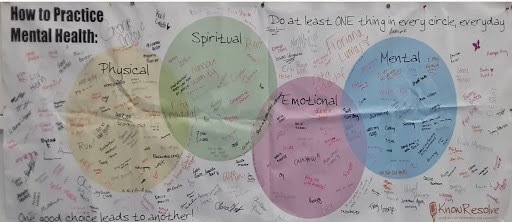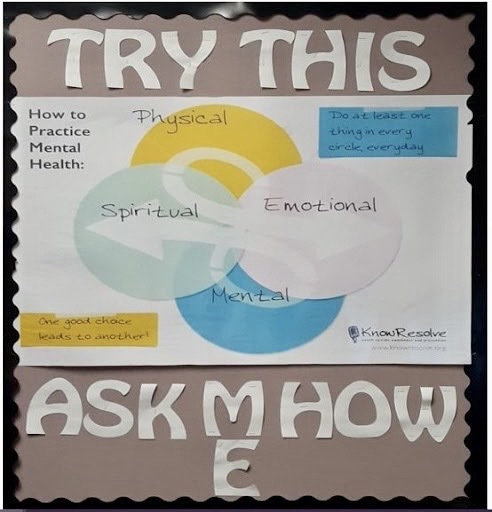School counselor Catherine Livingston has had the same bulletin board in her office for five years. It shows four overlapping, differently colored circles. Each circle contains a word representing one dimension of wellness: physical, spiritual, emotional or mental. “We need to be taking care of these four circles in order to be okay,” Livingston said at the American School Counselors Association national conference in July.
The four circles on display in her office are bordered by large, curving letters that read, “TRY THIS” and “ASK ME HOW.” Students do ask, she said. “They come in, they might be talking about their grades and they look and go, ‘What's that about?’” That question starts a conversation about self-care practices that comes out of student curiosity, rather than a lecture. Livingston, who is the 2022 Michigan School Counselor of the Year, described the four circles of self-care and gave examples:
- Physical - any kind of body movement, such as stretching, walking, dancing, sports and active games
- Emotional - ways of expressing emotions, such as journaling, art and music
- Mental - activities that challenge your brain, such as crossword puzzles and math problems
- Spiritual - activities that create a greater sense of purpose and worthiness, such as community service, mentoring or participation in faith communities
The visual model of the four circles of self care comes from Know Resolve, a nonprofit focused on youth suicide prevention. Adolescent mental health crises, including anxiety, depression and self-harm, have been on the rise for more than a decade, and the coronavirus pandemic has only worsened the trend. Whether or not they have a clinical diagnosis, Livingston said all teenagers need to develop skills for coping with stress, but the past three years have made clear that many haven’t. When talking with students about self-care, Livingston encourages them to write down three things they enjoy that fit into each circle and to attempt one of each daily. She said students often haven’t thought about those activities in relation to wellness, “But when you bring it to their attention that this is what's happening, they will continue to do it every day.”
Livingston said that many wellness practices are already happening in classrooms. For example, some English teachers at Utica Community Schools, where she works, assign students to write in journals. They’ve seen students continue to write in them daily, even though that’s not the requirement. Livingston said she’d like to see the wellness-related benefits of such activities spelled out more directly for students. “We need to tell them it’s important.”
The four circles are a simple model that teachers can point to for such explanations, and it can become part of the classroom or school vernacular. For example, one health teacher at Livingston’s school has a poster of the four circles that students tag with sticky note examples. They can also take sticky notes off of the poster if they see something they want to try. Livingston said that by allowing all students to contribute and exchange ideas, this exercise itself can be a boost to spiritual health.

As students begin to practice activities in all four circles, “You're going to see a difference in their grades, a difference in their attendance, and definitely a difference in their behavior,” Livingston said. She advised counselors and teachers not to expect sudden, radical transformation but to celebrate small successes, such as a student getting to class on time more often than the previous month.


